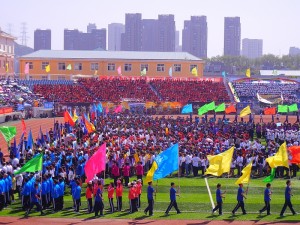God knows that I love bread. (Bread and I, however, are in the midst of a relatively amicable separation, and my waistline has noticed.) The student body at my university, and especially at the rich-kid college within it where I teach, is of a particularly well-fed demographic, and they see their grindstone bachelor’s degree exclusively as job training, nothing more. (The majority work in majors chosen for them, often with no real interest or aptitude in the subject but only faith in the promise of the “comfortable life” that most Chinese — understandably — seek.) Though privileged within Chinese society, they do endure acres of boredom and megatons of rote learning, so the circus does come to town. And though I am not above the occasional superior sneer at the circus entertainments chosen by others, I’m still a sucker for the Olympic march of the athletes, small-town parades, the communal experience of fireworks. Even loners like me love a good show, some high-wire performance, but I was recently put in mind of the ancient Roman poet Juvenal’s scorn of the use of “bread and circuses” to pacify a population.
It was Sports Day at my university in northeastern China, a day common to most schools here. It is a more of a show than a track and field meet, and actually two days of class are
sacrificed for it. Many students are required to miss class sessions in the days before in order to prepare, but not for their events. In a country where precious little importance is given to physical education – except, that is, for the tiny minority selected in their youth or childhood to attend State sports schools and bring sporting honour to their province or their Olympically-ambitious country – this once-yearly festival of geng kuai, geng gao, geng qiang (“faster, higher, stronger”) sees astonishingly little athletic preparation, or even the possibility of it. It drives my Canadian friend JP, a masters decathlete and long-time high-school coach, just slightly bonkers.

